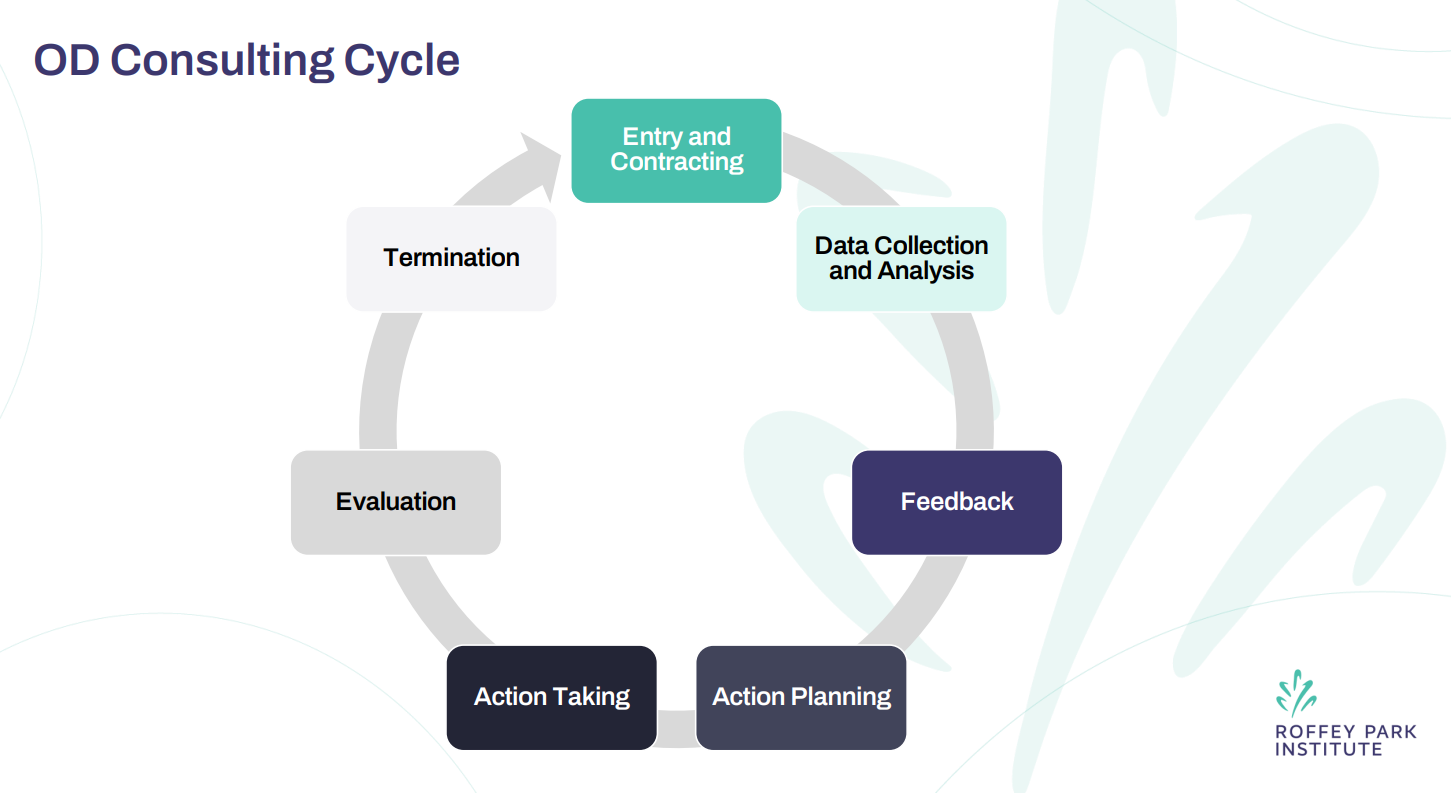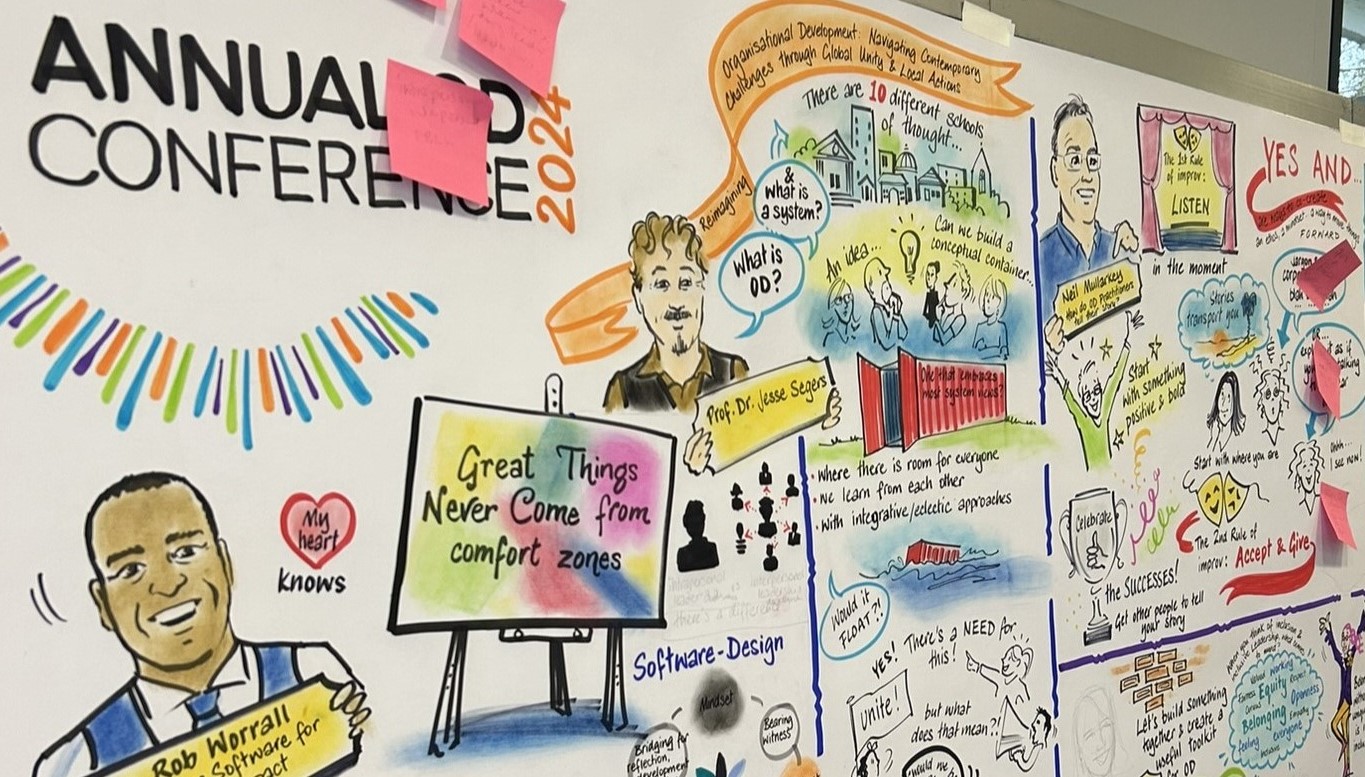Recently we sat down with Gavin Deadman, Learning and Development Partner at Manchester University who spoke about his journey on the Organisation Development Practitioners Programme (ODP). Gavin, alongside some of his colleagues, attended the OD Practitioners Programme as part of an in-house programme targeting their specific context and needs. Gavin shared some valuable insights into how he perceives Organisation Development (OD) in its current position as well as his and his team’s experience with OD, the language used around it and the importance of peer learning and self-confidence.
With an increase in self-awareness comes not only a bit of self-confidence but also a realisation as to where the future gaps are. Then with that self-confidence and self-realisation, you can actually have better conversations with clients.
The challenges
Initially, we asked why Gavin and his team at Manchester University enrolled on the OD Practitioners Programme to find out if they had any specific challenges, as a group, that they required addressing. Gavin explained how they wanted to upskill their practice in OD because as part of the Learning and Organisation Development team they have begun to increase their OD activity.
The trouble that the team had was that other people in the organisation struggled to comprehend a lot of the language that surrounds OD and the worth that OD provides. Gavin explained, “The team know to change our language when we’re talking to our client groups because quite a lot of the time in OD we tend to talk our own language. We’ve had a few new members of the team come in from other areas and it’s enlightening but a realisation because they say you do talk your own language.”
Another important reason for the cohort’s reason to enrol was that they felt they needed more knowledge in the area to increase their self-confidence. Gavin told us, “When people usually embark on something new, they tend to prefer to have a qualification or a piece of training behind them, whereas invariably, we don’t learn in the classroom, we learn by actually doing.” Ultimately, it was the ODP that would provide the qualification Gavin and his team were looking for to boost that confidence.
Solutions
Through the learning journey of the OD Practitioners Programme, Gavin and his team were encouraged through their Action Learning Sets (ALS) to learn through dialogue and by doing. This peer learning aspect of the programme encourages learners to share their progress and experience as well as support and challenge one another.

The content provided by Roffey Park facilitators throughout the programme was intended to provoke discussion and self-reflection. Gavin identified this aspect as one which he valued. He told us, “It is all about the discussions that the content provoked. I am part of the team that delivers the leadership programme at Manchester University in its current guise and the best feedback that I get is from the people that come together and talk about solutions. The ALS really resonated with us.”
Furthermore, the ODP requires learners to deliver group facilitation and an individual final presentation on participants’ business project outcomes, learning and reflective practice. Gavin explained how he found this aspect of the programme really useful. “The presentations showed the impressive learning curve of the people involved. The diverse strengths and approaches of the group were indicated by the differing styles of presentations.”
Considering Gavin and his team share a similar context in the workplace, we found it interesting that individual presentations varied as much as they did. Gavin told us how the presentations typically portrayed the approach that different people took and portrayed their personalities. “Presentations ranged from a detailed approach, which was quite thought-provoking and encouraged debate, compared to mine, which used few slides but provoked a discussion about our current state.”
Gavin continued, “The variance was great, however, there was a similarity in the fact that most of us used the consulting cycle (as seen below). I think that was a good thing because it is an approach which people have been using in the workplace through interactions with stakeholders and client groups. Everybody realised that they do use the model in their context and the fact everybody chose to use it I think is quite telling.”
The ODP provided the realisation that we were not experiencing a performance gap, but doing the right things in this area. It has probably enhanced our practice, if anything.

Outcomes and impacts
My final reflection came from one of my colleagues. She described towards the end of her presentation, that as she looked back on her year of work and considered the content of the programme, “hey look, I AM an OD practitioner!” If the programme has done that for everyone, it’s been a success!
Ultimately, it was about facilitating a ‘learning curve’ for Gavin and his team when it came to understanding what it meant to ‘do OD’ in the workplace. He told us, “The comprehension of the organisation is that they’ll come to us for learning solutions and we are more and more challenging that assumption and providing the organisation with what it needs and what it wants.” Instead of agreeing to a certain piece of required learning, development and training, in a gap that has been identified, Gavin is now more intent on getting underneath the issues as to why that request has come in and why a response is needed.
Furthermore, Gavin explained how he and his team are now doing a lot more data-driven analysis rather than anecdotal-driven analysis so that they can provide a suite of solutions, rather than just that one narrow solution, which they feel they need across a wider range of activities.
Thanks to the ODP… “In the future I feel we will have more stories of talent management, performance improvement and organisational design, to name just a few OD activities.”





